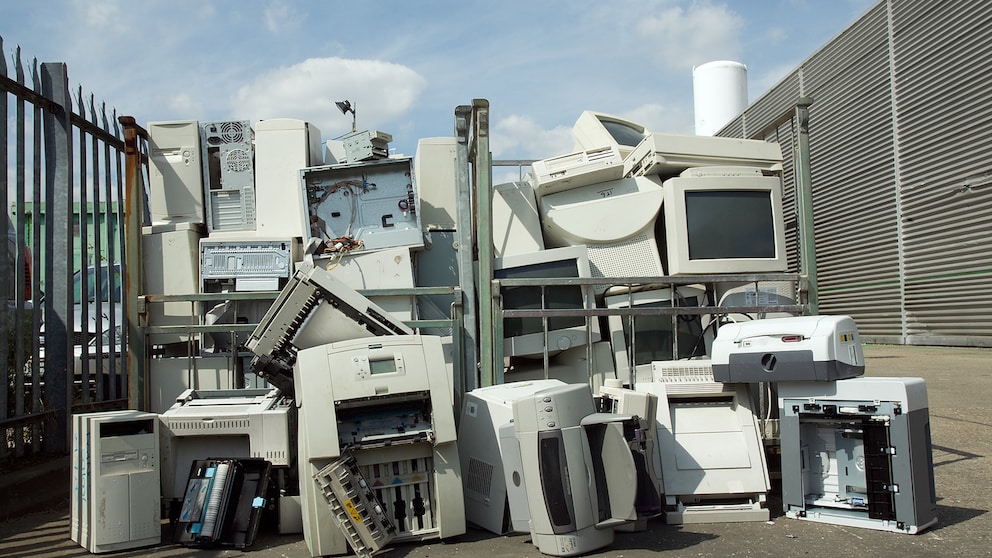September 17, 2024, 7:56 am | Read time: 4 minutes
Anyone who buys a new appliance is sooner or later confronted with the question of what to do with the old one. Especially if it is broken, there is often no way around disposing of it. TECHBOOK reveals what to look out for.
Before you finally dispose of your old electronic appliances, you should definitely check whether they are still in working order. This is because old smartphones or televisions may have another use – or someone may be happy to resell them. However, if this is not the case and repairs are not possible, you must dispose of electronic waste accordingly.
Retailers Are Required to Accept Old Devices
Since October 2015, retailers have been obliged to take back old appliances – regardless of whether they were purchased from the relevant supplier or not. This is regulated by Germany’s “Act on the Placing on the Market, Return and Environmentally Sound Disposal of Electrical and Electronic Equipment.”
However, there are some restrictions: The obligation only applies to retailers with a store area larger than 400 square meters. In addition, no edge of the appliance may be longer than 25 centimeters. If it is, the retailer only has to accept the product if you buy a similar appliance from them (§ 17). The quantity is also limited: You are only allowed to dispose of three products per appliance type in this way. If you want to dispose of larger electrical appliances in the relevant stores, you must buy a new one.
Incidentally, this regulation does not only apply to specialist stores. Supermarkets such as Rewe or Aldi are also obliged to take back electrical appliances if they sell them themselves, which is now the case for all major chains. The retailers’ obligation is a measure to comply with current EU directives.
Online retailers also obligated to accept electronic waste
Incidentally, the same applies to online retailers as to brick-and-mortar stores. Online stores are obliged to take back waste if their storage and shipping area is larger than 400 or 800 square meters. The corresponding calculation has been applied since July 1, 2022.
Incidentally, smaller stores often also accept old appliances as a gesture of goodwill. In general, the service must be free of charge for customers. Only transportation costs may be charged if necessary.
When unsure, dispose of electronic devices at the recycling center
In the vast majority of cases, electrical appliances must never be disposed of with household waste. This is indicated by a symbol showing a crossed-out dustbin. Not even small batteries or rechargeable batteries belong in the household waste garbage can. Instead, there are appropriate collection points, often in supermarkets, for example. Careful disposal is important because there is an acute risk of fire with batteries and accumulators containing lithium.
One option that is always available is to go to a recycling center. There, you can also get rid of your electronic waste free of charge.

What will change for contactless payment cards in the future

Does a full refrigerator consume more electricity than an empty one?

Do digitally purchased products really belong to me? Which regulations apply
Penalties for illegal disposal of electronic waste
Since March 24, 2006, the Electrical and Electronic Equipment Act has stipulated that disposal of household waste is prohibited. This is because circuit boards and chips often contain precious metals that can be recycled. Some appliances also contain lead, which is harmful to the environment.
The disposal of electronic waste in household waste is punished differently from state to state. “As a result, the fines imposed can vary. In Bavaria, for example, the fine can be between 80 and 240 euros for an illegally disposed electrical appliance,” explains Thomas Hollweck, consumer law lawyer. “The situation escalates if illegal disposal leads to environmental pollution, as this can elevate the matter from a fine to a criminal offense,” adds the expert.
There is a separate catalog of fines for the illegal disposal of electrical appliances. This differentiates according to the number of products disposed of. For instance, in Mecklenburg-Vorpommern, the fine for a single device is relatively minor. However, this federal state has one of the most severe penalties for the illegal disposal of more than one appliance, with fines of up to 5,000 euros. Only in Saxony can it be more expensive, with fines of up to 10,000 euros.

